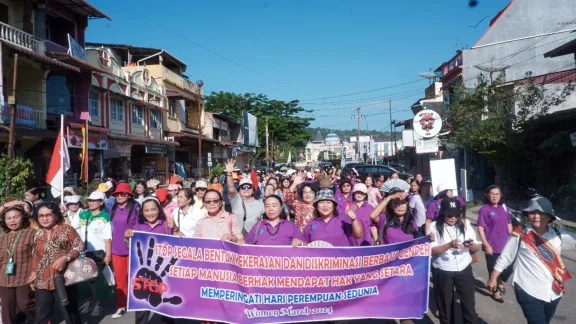
Participants in the “Stop Women’s Violence March” in Nias, Indonesia. This is part of an LWF-supported project by the Protestant Christian Church (Banua Niha Keriso Protestan) on gender equality, justice, and the right for women to live free from violence in the country. Photo: BNKP
Women-led campaign toward economic stability, food security and leadership roles
(LWI)—Women in Nias, Indonesia, train and advocate for a better future and more agency in family and society. The Protestant Christian Church (Banua Niha Keriso Protestan-BNKP), an LWF member church, runs women-led advocacy and capacity-building activities. These activities are meant to empower women to build economic stability, improve the food security in their families, and to take up leadership roles in the church and public life.
Nias, an Island in North Sumatra province, is well known for its diversity of festivals and celebrations, including music performed chiefly by women. The church initiated the project in a context where women are rarely involved in decision-making because of patriarchal culture, gender discrimination, and limited access to education and employment.
The third phase of the BNKP Women's Empowerment and Capacity Development Project addressed gender inequality and women's rights on the island. This year, the activities focused on public engagement through gender-themed advocacy, including campaigns, workshops, and cultural activities, all aimed at empowering women and highlighting their vital role in community development.
The Lutheran World Federation (LWF) supported the BNKP campaign through the communion's program on Member Church Projects.
Nias women's declaration
A significant outcome of the BNKP was the "7-Point Statement of Nias Women," a declaration which addressed the ongoing struggles of Nias women, including domestic violence, social discrimination, and limited participation in public life. It highlighted the need for a unified stance among Nias women to fight for their rights and dignity, emphasizing that gender equality should begin within the family unit and extend to broader societal structures.
"We realize that until now, women in the context of Nias culture are still experiencing many struggles and challenges to raise their dignity as human beings," the activity report stated in part. "There is a need for synergy between the church, government, and stakeholders to jointly prevent and combat gender injustice and transform cultural values that are considered detrimental to women," it noted.
Women in the context of Nias culture are still experiencing many struggles and challenges in an effort to raise their dignity as human beings
Report, Protestant Christian Church
The BNKP project also provided training on loans and savings for women in congregations to improve their financial management skills and promote economic independence. The church also offered counseling sessions to educate women on the connection between nutrition, child health, and long-term community well-being. "Education and better access to health care improves the health of women and families, helps reduce maternal and child mortality, and prevents stunting and malnutrition of children and families as a whole," the report stated.
Promoting gender equality
Another key event was the "Stop Women's Violence March" held in the Nias regency's capital, Gunungsitoli, commemorating International World Women's Day earlier this year. Two hundred eighty people attended the event, including representatives of other Christian denominations and the Muslim community and local leaders who emphasized gender equality, justice, and the right for women to live free from violence. The march underscored the solidarity of Nias' women in fighting against the injustices they face. The women demanded to be part of policy-making processes.
In addition to the march, participants participated in a workshop entitled "Let Us Unite in Fighting Violence, Discrimination, and Gender Inequality." The topics touched on the role of Nias' women in politics, community development, and cultural transformation. The goal was to equip women with the knowledge and confidence to participate actively in decision-making and leadership roles.
Art performances and cultural dances, such as the traditional Maena dance, conveyed messages of gender justice, celebrated the rich heritage of Nias culture, and highlighted women's resilience and creativity.
The report concluded that BNKP will ensure the sustainability of these initiatives through its Diakonia Department, "with a focus on empowering women in unreached areas and promoting gender equality in all aspects of life."


